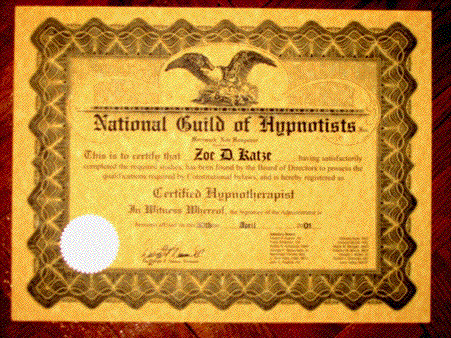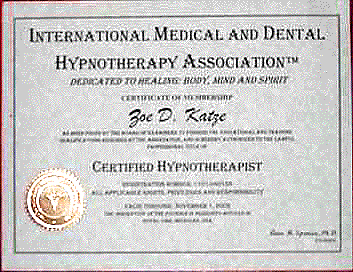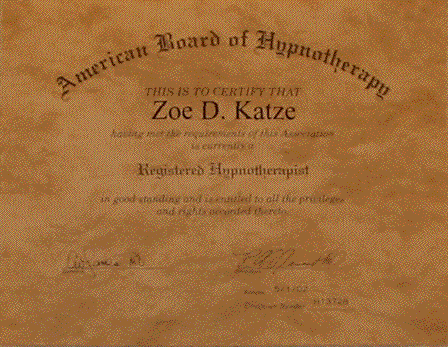The cat is
out of the bag.
After many months, I've
finally been pushed to finish this article on questionable
credentialing in hypnosis and "psychotherapy." A reporter from
a major magazine wrote to "Dr. Zoe D. Katze" for input on an
article she was writing on hypnosis for childbirthing. She had
stumbled across Dr. Zoe's name on the American Association of
Professional Hypnotherapists' website. I had to tell her the
truth.
Dr. Zoe D. Katze, Ph.D.,
C.Ht. is a cat. In fact, she is my cat. Those familiar with
basic German have probably already enjoyed a laugh. "Zoe Die
Katze" literally translates to "Zoe the cat."
Dr. Katze's credentials look
impressive. She is certified by three major hypnotherapy
associations, having met their "strict training requirements"
and having had her background thoroughly reviewed.
I was motivated to
credential my cat by two circumstances. First, I have become
increasingly heedful of all the questionable credentials out
there, and I've grown tired of sounding defensive to
therapist-shopping clients who confront me with something along
the order of: "I found somebody with all these certifications
and diplomas and he/she charges half of what you psychologists
charge."
The last straw (and my
moment of inspiration) came during an internet search for a
colleague. I accidentally came upon the website of another
"psychotherapist" who listed a doctoral degree from an infamous
diploma mill. Along with his degrees, he listed a veritable
alphabet soup of impressive-looking letters after his name,
corresponding to various "board certifications" and his status
as a "Diplomat [sic] and Fellow" of the "largest
professional hypnosis association in the world."
I decided to credential my
cat.
This was a surprisingly easy
thing to do. First, since so many financial transactions are
conducted by credit card, I had to get Zoe some credit. No
problem; I just added her as an "authorized user" of one of my
own credit cards. (The credit card agent asked for Zoe's social
security number, but then cheerfully relented when I told him
it would take me some time to search for it.)
The rest was equally as
easy. In the nefarious world of quasi-credentialing and diploma
scams, money talks. Or at least it meows. All I had to do was
get Zoe her first credential, which I did by filling out an
"application for certification" on a lay hypnosis association's
website. I charged her application fee, and within a few weeks,
Zoe had her first piece of paper. Since most lay hypnosis
associations have a reciprocity agreement respecting each
others' certifications, it was a snap to obtain additional (and
very impressive sounding) certificates.
Zoe is (or was, since I
doubt I will pay certification maintenance fees) certified by
the National Guild of Hypnotists, the American Board of
Hypnotherapy, and the International Medical & Dental
Hypnotherapy Association. She is a Professional Member of the
American Association of Professional
Hypnotherapists.
Not bad for a cat who's not
even purebred.
What do credentials mean,
really? In most health professions, the basic credential is a
license. Psychotherapy and hypnotherapy are activities that are
difficult to regulate. With few possible
exceptions--psychological testing may be the only one--they do
not require an ability to utilize a clearly-defined or unique
technology (like surgery) or a tangible asset (like
pharmaceuticals). Instead, they rely primarily or exclusively
on communication and human interaction. Ultimately, then, we
are up against a seemingly impossible proposition: How does one
"license" a form of human interaction? Licensing boards have
taken on this improbable task, but they typically do not
attempt to define or enforce any set of behaviors except upon
those who submit to licensing. Of course, there are strong
incentives to being licensed, like the ability to qualify for
insurance reimbursement or for certain agency, healthcare
service or government positions. But by and large one can get
by without a license to practice, especially if one has other
sources of income. Some unlicensed practitioners have succeeded
quite handsomely, thank you; unlicensed therapist-cum-author
John Gray is one of the prime examples, neurolinguistic
programmer and motivational speaker Anthony Robbins is
another.
And for the thousands of
private practice "counselors" and "therapists" who are engaged
in what is essentially a small part-time business or even a
hobby (they do not need this income to survive), licensing is
largely superfluous and--with its rigid experience
requirements, laborious application and examination procedures,
and continuing education requirements--perhaps even an
irritant.
In psychology and mental
health, research on whether licensing actually assures
competence has yielded inconclusive results. Nevertheless,
licensing and certification are minimally capable of doing two
things: (1) guaranteeing that an individual possesses a
journeyman's fund of basic information (at least at the time of
the examination) and shares a somewhat common
educational/training experience; (2) providing a system of
accountability to the public.
Compared with the
conservative, rigidly regulated and highly structured world of
medicine, psychotherapy is the wild west of credentialing. When
a physician claims board certification, her patients can be
reasonably assured that their doctor has completed a fairly
uniform course of training and has passed a tough examination.
In mental health, credentialing is a far more varied and
amorphous affair. Until relatively recently, "board
certification" meant one was either Diplomated by the American
Board of Professional Psychology (ABPP) or, if a social worker,
by the American Board of Examiners in Clinical Social Work.
There were also a small number of proficiency certifications
available (e.g., rehabilitation counseling, career counseling)
to those who completed substantial training requirements (and
usually an examination) in that area.
But, in my opinion,
something happened in the 1980s and '90s that led directly to
the proliferation of credentialing (and pseudocredentialing) in
mental health. First, the advent of managed care, coinciding
with the proliferation of graduate school programs in mental
health (especially at the masters degree level), led to
uncontrolled growth in the supply of practitioners while demand
became increasingly restricted. As a result, many mental health
practitioners began to scramble for a means (any means) to
distinguish themselves, to be perceived as above the common
horde, to be singled out.
Second, the last 20 years
have seen a proliferation of specialties and "techniques," some
valid, others a bit dubious, and still others the peculiar
invention of their creators. In some cases, like trauma
treatment, neuropsychology and forensic psychology, specialties
were essentially invented where none existed before, due
primarily to advances in the science as well as the practice of
psychology. However, other more arguably dubious credentials
also came into existence, leading to the development of
"certified specialists" from "energy therapist" to "alien
abduction therapist" to "past life regression
therapist."
How confusing this must be
to clients and consumers of our services. And how frustrating
this is to the legitimate clinician who might be left feeling
"credential challenged" or even intimidated by the therapist
who advertises him/herself with multiple impressive-sounding
credentials.
Would additional laws help?
In my opinion, probably not. In fact, l can not think of a
legal or legislative solution that would positively impact
credentialing without creating even worse problems. Unlike
medicine, which often involves immediate life and death issues,
mental health clinicians typically treat more subtle and (with
the exception of a relatively small percentage of critical
emergencies) less immediately dangerous situations. As a
result, the public and our lawmakers are less likely to worry
about the inflated or even implausible claims made by some
therapists. In addition, we clinicians have traditionally
operated under a kind of libertarian tradition. By and large we
loathe guidelines, treatment manuals, or any external agent
claiming to be able to judge or measure our competence. Nor do
we want anything beyond broad and inclusive suggestions when it
comes to external agents telling us what constitutes "good" vs.
"bad" therapy. And for good reason. Human behavior and the
"mind" are just more complicated than, say, the liver or a
broken bone. What is "good" and "bad" for the psyche is not as
easily defined as what is good for the liver or bad for the
fibula. We psychotherapists continue to argue and debate these
issues, and I for one value our disagreements. I hope we never
come to completely understand the mind and what is "right" for
it. (If we ever did, we would be a short skip and a jump away
from a form of psychologically-sanctioned fascism that would
make Orwell's 1984 seem like a hippie utopia.) Those who claim
to know the absolute truth about the human psyche are more
likely to be psycho-demagogues and therapy cult leaders than
benevolent role models.
So it seems that, with the
possible exception of the most outrageous forms of "certified
therapies," we are doomed to tolerate an extremely broad array
of credentialing bodies, from the legitimate to the
questionable to those that are outright shams. It is up to each
of us to examine our own motivations for obtaining credentials
(both legitimate and dubious), to police ourselves and our own
professions, and to do our best to educate the
public.
Still, one has to ask: What
value can a credential hold when it can be so easily obtained
for a common household pet? I expect the unmasking of Dr. Zoe
D. Katze, Certified Hypnotherapist, will make some people very,
very angry. I hope they will find it within the purview of
their anger to demand serious changes in the credentialing
process employed by these associations.
Limiting a credential to
homo sapiens would be a good start.




